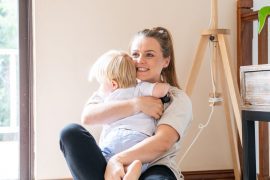By Tracy Cassels
I work with a lot of families, and something they almost all inevitably struggle with are the periods of sleep regressions that accompany so much of the first couple years of our children’s lives. The reduction in sleep due to teething, learning to walk, growth spurts, learning to talk, cognitive development, social development, and so on leaves families not only tired, but questioning everything they have done up to that point. Specifically, wondering what they have done wrong.
For many families, these periods represent a period of something lost. A skill their child once had seems to have disappeared completely. This way of thinking is what makes something like, “Oh you’ve created the wrong sleep associations”, so very tantalising to many families and they end up falling prey to the extinction sleep training camp. As such, I think it is incredibly important to dispel this myth – yes, it’s a myth – and perhaps start thinking of using different terminology altogether to help our kids and ourselves better understand what’s happening.
WHY “REGRESSION” IS WRONG
First, let’s look at what a regression is. By definition, regression means a return to a former or less developed state or a trend or shift toward a lower or less perfect state. Merriam-Webster provides the following four examples:
- Progressive decline of a manifestation of a disease
- Gradual loss of skills or memories or functions due to aging or disease
- Reversion to an earlier mental or behavioural level
- The statistical relationship
It’s no wonder when people hear the word, they start thinking of skills lost, even though the initial reason for the use of “regression” as a term for sleep is that it just refers to the previous state of greater arousals and awakenings. The part to do with development or skills just simply has no bearing here. In fact, many “sleep regressions” occur during periods of greater development resulting in the antithesis of the less developed state.
For many families, these periods represent a period of something lost. A skill their child once had seems to have disappeared completely.
However, even when we look at what is happening with sleep during the periods, it is difficult to believe that it’s even just a return to a former state. Sleep isn’t the same. Yes, our children may wake more, but it’s not like the newborn waking that happens frequently but (hopefully) without other associated behaviours. When our children go through a developmental leap, their sleep disruptions are often accompanied by other behaviours such as movement in sleep (when learning new motor skills), talking in sleep (when acquiring expressive language), crying (when acquiring teeth or physically growing), or nightmares (when experiencing separation anxiety). Their sleep hasn’t devolved, but has truly shifted and changed.
WHAT IS HAPPENING?
If children aren’t losing much-needed skills to help them sleep, what is happening? First let’s make it clear that your children still have the same skills they had before. When they were actively self-settling or able to fall asleep once in a while without help, those skills are still there. It’s just that those skills are still only doable when there are minimal interruptions. This is why you knew your child couldn’t engage in any behaviour like that when they were sick – illness prevented them from using their skills. With leaps, it’s the same except instead of feeling crummy being the culprit, the various developmental changes taking place are the issue at hand. These leaps tax our children’s systems in ways that make it much harder for them to use the skills they have in place.
This isn’t surprising given how new these skills are for them. I like to think of it as being like a person starting a diet. If you’ve never gone on an elimination diet, it’s hard at first and soon you are able to do it well enough if it’s easy. That is, you can avoid whatever it is you’re eliminating if you have other foods readily available, the time to prepare healthier choices, you aren’t over-hungry, you aren’t stressed, and so on. As you practise this skill of eliminating certain foods, you’ll be able to do it in some more difficult circumstances, but chances are it’ll still be taxing in other cases.











